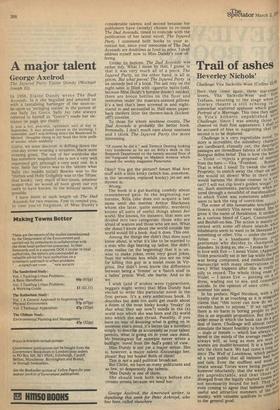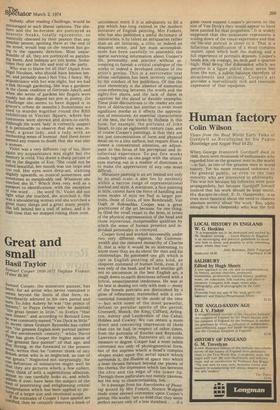Trail of ashes
Beverley Nichols'
Challenge Vita Sackville-West (Collins E2.50) Here they come again, these star-crossied, lovers, Vita Sackville-West and VicHhee. Trefusis, returning to the stage when tL'e literary theatre is still echoing to t" somewhat scattered applause which greeter Portrait of a Marriage. This time they aPPeapl in Vita's hitherto unpublished otrIvh-c Challenge. Since I was among those 0'01 cheered on their first appearance, I shall 11,4 be accused of bias in suggesting that th'' second is to be deplored. Challenge is a very regrettable novel. 1:11,e story is incredible; the subsidiary charact,e; are cardboard, clumsily cut; the descriP0ht passages are threadbare fabrics of cliches; t.'f dialogue defies belief. This is how the heroolf c Violet — rejects a proposal of marriae, from the hero — Vita. "Freedom ... Romallol That is what I need! To tweak the nose.0 Propriety, to snatch away the chair on vitlie she would sit down! Who in their sens.ii would harness the divine courser to cart? I will not clip love's golden wings!" etc. Such sentiments, particularly when IP' ' tered through a mouthful of marshmallow ,5, to which Violet was sometimes addicte° seem to lack the ring of conviction. h i5 The scene of this lamentable hotchpotc-,,,, Greece, a country Vita never visited. She l'": given it the name of Herakleion. It strikes as a curious blend of Capri, Constantin01)111 and Bexhill-on-Sea. The action is mainlY,C„cs. cerned with some off-shore islands w!'t; inhabitants seem to want to be liberated fl."0: something or other. Vita — under the nalverii Julian — is a handsome Byronic Y°eti'. gentleman who decides to champion tii; islanders. In doing so, she — I mean he in love with Eve — I mean Violet. (ApPare01,s' Violet practically sat in her lap while the l)°„ was being composed, and embellished th'to manuscript with many observations of tor own.) What happens after this is reallYit silly to record. The whole thing ends Violet — I mean Eve — putting on a dress, wading out to sea, and comalittit: suicide. In the opinion of once critic, ne
moment too soon. filP In his preface, Nigel Nicolson, with a
loyalty that is as touching as it is misgin'oti claims that "this novel can now do no co ceivable harm to anyone." If we agree to there is no harm in boring people to dea.s, this is an arguable proposition. But there Id wider sense in which the book can do a gr.flis deal of harm. Challenge will almost cert3ll11s stimulate the latent hostility to homosextl ',au'o — male or female — which has alwaYs safic bered in the minds of the average reader, od always will, as long as men are lnetlh dis women are double-breasted. It is a boo' vis sets the clock back. We had come a long Lod since The Well of Loneliness, which Pers,,cfr ed a vast public that all lesbians had 11'05 and tails. Even the stuffiest and rn°staded tinate sexual Tories were being Per,.s".t0 however reluctantly, that the ways of rl-voc, are unpredictable, and that those we diverged from the legally charted routes weriltj not necessarily bound for hell. TheY ht even coming to agree that lesbiansrnign:,ofir useful and attractive members of the !'1,,titi munity, with valuable qualities to contriv to the general good.
Nobody, after reading Challenge, would be encouraged in such liberal opinions. The shehero and the he-heroine are portrayed as neurotic freaks, totally egocentric, so nianically obsessed by their passion that any sensible person, spotting them at the end ot the street, would leap on the nearest bus going in the opposite direction. Most unpardonable of all, they are portrayed as paralysing bores. And lesbians are not bores. Sometimes they are the life and soul of the party. Who was to blame for all this? (Apart from Nigel Nicolson, who should have known better, and probably does.) Not Vita, I fancy. My acquaintance with her was slight, but we had a, link through gardening. She was a gardener in the classic tradition of Gertrude Jekyll, and When she wrote of gardens her fingers were muddy but she dipped her pen in poetry. (In Challenge she seems to have dipped it in grocer's crème de menthe.) Sometimes we used to wander together round the RHS exhibitions in Vincent Square, where her comments were shrewd and down-to-earth. Although the word 'lady' is currently suspect IS permissible to observe that she was, indeed, a great lady, and a lady with an enchanting sense of humour. And there never seemed any reason to doubt that she was also a woman.
Violet was a very different cup of tea. Here again my acquaintance was slight but the memory is vivid. Vita draws a sharp picture of her in the disguise of Eve. "She could not be called beautiful; her mouth was too large and too red. Her eyes were deep-set, slanting Slightly upwards, so ironical sometimes and sometimes so inexplicably sad. Whatever she touched she lit." Which does very well as a Passport to identification, with the exception 0.f one word .. . the word 'lit.' Violet did not light what she touched, she scorched it. She Was a smouldering woman and she scorched a great many things and a great many people. She left behind her a trail of ashes, and it is high time that we stopped raking them over.

































 Previous page
Previous page